Go Lean Commentary
All stakeholders in America – and other countries – must act now to “flatten the curve” with this Coronavirus crisis:
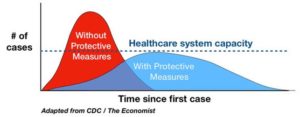

There is the role for doctors, nurses and other clinicians in the delivery of medical best practices; then there is also the role for the general public. Yes, the Public Health prescription for America to get past this Coronavirus crisis is abbreviated to these 3 words:
Netflix and chill …
Yep, it is that simple; the country needs to Shelter-in-Place and practice Social Distancing, so the best option is to stay home and occupy your time with streaming video and other online media.
That is it! That is the heavy-lifting that Americans need to do to sustain their economy. (Overall, “Hollywood” has been severely impacted by this COVID-19 pandemic – see Appendix VIDEO).
Netflix, as the market leader – as of April 2019 … over 148 million paid subscriptions worldwide, including 60 million in the United States, and over 154 million subscriptions total including free trials [12] – is being presented here as a “metonym“ …
[Metonym = a word, name, or expression used as a substitute for something else with which it is closely associated; like Wall Street for American Capital Markets or Hollywood for American Movie-TV-Game industries].
… an icon that symbolizes the rest of the media industry delivered by Internet & Communications Technologies (ICT). While Netflix is #1 – as a financial opportunity, early adaptors have seen an amazing 15,460% return on their investment – there are other streaming sites that deliver the same functionality. According to Wikipedia, this whole industry is referred to as:
Over-the-top media service
An over-the-top (OTT) media service is a streaming media service offered directly to viewers via the Internet. OTT bypasses cable, broadcast, and satellite television platforms, the companies that traditionally act as a controller or distributor of such content.[1]
The term is most synonymous with subscription-based video-on-demand (SVoD) services that offer access to film and television content (including existing series acquired from other producers, as well as original content produced specifically for the service). Examples include:
Amazon Music, Apple TV+, Disney+, Google Play Movies & TV, HBO Max, Hulu, iTunes, Netflix, Prime Video, SiriusXM, and YouTube Premium.
OTT also encompasses a wave of “skinny” television services that offer access to live streams of linear specialty channels, similar to a traditional satellite or cable TV provider, but streamed over the public Internet, rather than a closed, private network with proprietary equipment such as set-top boxes.
Over-the-top services are typically accessed via websites on personal computers, as well as via apps on mobile devices (such as smartphones and tablets), digital media players (including video game consoles), or televisions with integrated Smart TV platforms.
Due to the public assimilation of these OTT services, the traditional American television networks have responded to the competition – for public eyeballs – with streaming products of their own. Consider these two examples:
- CBS All Access – [This] American over-the-top subscription streaming video on demand service owned and operated by CBS Interactive, a subsidiary of ViacomCBS. It offers original content, content newly aired on CBS’s broadcast properties, and content from CBS’s library. In the United States, many markets offer a live stream of the local CBS affiliate’s main channel.
The service is noted for streaming the Grammy Awards and Star Trek: Discovery and Star Trek: Picard,[1] among other original shows. As of February 2019, it has more than 4 million subscribers.[2][3]
- Peacock (NBC) – an upcoming American over-the-top subscription video on demand streaming service by NBCUniversal, a subsidiary of Comcast. Named after the logo of NBC, the service is set to launch on July 15, 2020, with early availability for Xfinity customers starting on April 15, 2020.[1][2][3]
… [The new service will feature] content from its entertainment brands. It was also announced that the service would be free and ad-supported for customers of NBCUniversal pay-TV, Comcast, and eventually Sky; viewers without a pay-TV subscription or viewers who do not want advertisements can also subscribe to an ad-free version of the service. … [The service will] also include new original programming.
There is a lesson in this directive for us in the Caribbean; we must design, develop and deploy our own Caribbean streaming network, our own Netflix. This is a Big Hairy Audacious Goal (BHAG) for Caribbean society; we must do what America has done with Netflix and do it better. The extra effort is tied to the fact that we are more pluralistic with a multilingual society. The Caribbean solution must accommodate 4 languages: Dutch, English, French and Spanish so as to cover the 42 million in the 30 member-states.
 No one language is to be considered the default or preferred over the others.
No one language is to be considered the default or preferred over the others.
Every month, the movement behind the 2013 book Go Lean…Caribbean presents a Teaching Series on a subject germane to Caribbean life. For this March 2020, our focus is on BHAG efforts that are too big for any one member-state alone. This is the final entry for this series, 6-of-6, which addresses live-work-play activities for all economic engines in society: economic, security and governance.
The full catalog of the series for this month – under the BHAG theme – is listed as follows:
- BHAG – The Audacity of Hope – Yes, we can!
- BHAG – Regional Currency – In God We Trust
- BHAG – Infrastructure Spending … finally funding Toll Roads
- BHAG – One Voice – Foreign Policy and Diplomatic Stance
- BHAG – Outreach to the World – Why Not a Profit Center
- BHAG – Netflix, Hulu, CBS, Peacock è Caribbean Media
In addition to the 42 million people in the Caribbean member-states, there is also the Diaspora, estimated in some circles to be 20 – 26 million people; (the disparity is due to the status of first generation “legacies”; only “some” identify with the homeland). Any network that emerges from this Caribbean effort would have the Diaspora included in the target market. This is a familiar theme for this movement behind the Go Lean book. In addition to the direct references to Internet & Communications Technologies (ICT) in the 2013 book, there have been a number of previous Go Lean commentaries that elaborated on this theme of deploying a new ICT-based Caribbean network; consider this sample list here:
| https://goleancaribbean.com/blog/?p=17822 | Caribbean Youtuber providing a Role Model with Expanded Audiences |
| https://goleancaribbean.com/blog/?p=17250 | Way Forward – Caribbean ‘Single Market’ for Media |
| https://goleancaribbean.com/blog/?p=15858 | Network Mandates for a New Caribbean |
| https://goleancaribbean.com/blog/?p=14224 | How the Youth are Consuming Media Today |
| https://goleancaribbean.com/blog/?p=13321 | Making a ‘Pluralistic Democracy’ – Multilingual Realities |
| https://goleancaribbean.com/blog/?p=6464 | Sports Role Model – ‘WWE Network’ |
| https://goleancaribbean.com/blog/?p=3244 | Sports Role Model – espnW. |
| https://goleancaribbean.com/blog/?p=2171 | Sports Role Model – Turn On the SEC Network |
In the Go Lean book and these previous blog-commentaries, this movement asserts that the market organizations and community investments to garner economic benefits of ICT is within reach of our people, with the proper technocracy. As related in a previous blog-commentary, the eco-system for streaming videos – i.e. Netflix, Hulu, WWE, ESPN-W, Amazon Prime, etc. – is inclusive of the roadmap’s quest to make the Caribbean region a better place to live, work and play.
Yes, we can …
… build our own Caribbean streaming network. We have the successful model to emulate in the deliveries of the company Amazon. They are an e-Commerce company that processes fulfilment services and ICT media services as well. We have previously (October 1, 2018) elaborated on this Amazon role model:
Amazon: ‘What I want to be when I grow up’
This one company is worth US$1 Trillion. The whole Caribbean’s Gross Domestic Product (GDP) is [far] less; it is our plan to elevate the economic engines in the region to get the economy’s output up to $800 Billion.Amazon is a model for e-Commerce, logistics, media and innovation. This is the role model we want for our Caribbean Postal Union and the aligning online portal, www.myCaribbean.gov. It is good to have a roadmap to follow to duplicate the successful journey of Amazon.
This commentary concludes this March 2020 series on our Big Hairy Audacious Goals for the Caribbean. Many people are able to consume Netflix and other streaming services now, though the networks and programming is not really intended for us in the Caribbean. It is time now to design, develop and deploy our own. This will be a good investment for the future of media (TV and Movies) and ICT in our region.
This vision of our own streaming network is conceivable, believable and achievable. We urged all Caribbean stakeholders to lean-in to this Go Lean roadmap. This is how we make our homeland a better place to live, work and play. 🙂
About the Book
The book Go Lean…Caribbean serves as a roadmap for the introduction and implementation of the technocratic Caribbean Union Trade Federation (CU), for the elevation of Caribbean society – for all member-states. This CU/Go Lean roadmap has these 3 prime directives:
- Optimization of the economic engines in order to grow the regional economy to $800 Billion & create 2.2 million new jobs.
- Establishment of a security apparatus to ensure public safety and protect the resultant economic engines.
- Improve Caribbean governance to support these engines, including a separation-of-powers between the member-states and CU federal agencies.
The Go Lean book provides 370-pages of turn-by-turn instructions on “how” to adopt new community ethos, plus the strategies, tactics, implementations and advocacies to execute so as to reboot, reform and transform the societal engines of Caribbean society.
Download the free e-Book of Go Lean … Caribbean – now!
Who We Are
The movement behind the Go Lean book – a non-partisan, apolitical, religiously-neutral Community Development Foundation chartered for the purpose of empowering and re-booting economic engines – stresses that reforming and transforming the Caribbean societal engines must be a regional pursuit. This was an early motivation for the roadmap, as pronounced in the opening Declaration of Interdependence (Pages 12 – 14):
xi. Whereas all men are entitled to the benefits of good governance in a free society, “new guards” must be enacted to dissuade the emergence of incompetence, corruption, nepotism and cronyism at the peril of the people’s best interest. The Federation must guarantee the executions of a social contract between government and the governed.
xvi. Whereas security of our homeland is inextricably linked to prosperity of the homeland, the economic and security interest of the region needs to be aligned under the same governance. Since economic crimes … can imperil the functioning of the wheels of commerce for all the citizenry, the accedence of this Federation must equip the security apparatus with the tools and techniques for predictive and proactive interdictions.
xxiv. Whereas a free market economy can be induced and spurred for continuous progress, the Federation must install the controls to better manage aspects of the economy: jobs, inflation, savings rate, investments and other economic principles. Thereby attracting direct foreign investment because of the stability and vibrancy of our economy.
xx. Whereas the results of our decades of migration created a vibrant Diaspora in foreign lands, the Federation must organize interactions with this population into structured markets. Thus allowing foreign consumption of domestic products, services and media, which is a positive trade impact. These economic activities must not be exploited by others’ profiteering but rather harnessed by Federation resources for efficient repatriations.
xxvii. Whereas the region has endured a spectator status during the Industrial Revolution, we cannot stand on the sidelines of this new economy, the Information Revolution. Rather, the Federation must embrace all the tenets of Internet Communications Technology (ICT) to serve as an equalizing element in competition with the rest of the world. The Federation must bridge the digital divide and promote the community ethos that research/development is valuable and must be promoted and incentivized for adoption.
xxviii. Whereas intellectual property can easily traverse national borders, the rights and privileges of intellectual property must be respected at home and abroad. The Federation must install protections to ensure that no abuse of these rights go with impunity, and to ensure that foreign authorities enforce the rights of the intellectual property registered in our region.
xxx. Whereas the effects of globalization can be felt in every aspect of Caribbean life, from the acquisition of food and clothing, to the ubiquity of ICT, the region cannot only consume, it is imperative that our lands also produce and add to the international community, even if doing so requires some sacrifice and subsidy.
xxxii. Whereas the cultural arts and music of the region are germane to the quality of Caribbean life, and the international appreciation of Caribbean life, the Federation must implement the support systems to teach, encourage, incentivize, monetize and promote the related industries for arts and music in domestic and foreign markets. These endeavors will make the Caribbean a better place to live, work and play.
Sign the petition to lean-in for this roadmap for the Caribbean Union Trade Federation.
——————
Appendix VIDEO – Coronavirus – Covid-19: film industry counting the cost of ongoing crisis – https://youtu.be/h-ZW6OU6tIU
Posted March 26, 2020 – The film industry, like many others, is affected by the coronavirus pandemic. FRANCE 24’s culture editor Eve Jackson tells us more.
Subscribe to France 24 now: http://f24.my/youtubeEN
FRANCE 24 live news stream: all the latest news 24/7 http://f24.my/YTliveEN
Visit our website: http://www.france24.com
Subscribe to our YouTube channel: http://f24.my/youtubeEN
Like us on Facebook: https://www.facebook.com/FRANCE24.Eng…
Follow us on Twitter: https://twitter.com/France24_en
- Category: News & Politics
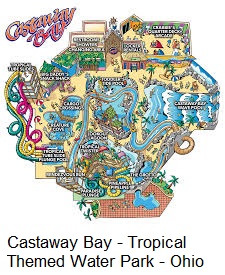 Yes, we can …
Yes, we can …





 Face the truth, the “little one” is often invisible and ignored …
Face the truth, the “little one” is often invisible and ignored … “One Accord”, in this case, does not refer to the vehicle from the Japanese Auto Company Honda …
“One Accord”, in this case, does not refer to the vehicle from the Japanese Auto Company Honda …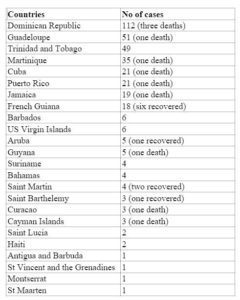
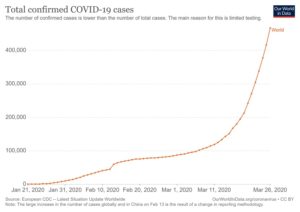 China, South Korea, Iran, Italy have individually engaged in unifying their voice for consistent leadership in this Coronavirus battle. Now, we have many Caribbean nations that have been afflicted – people have died – but we need the rest of the world to respect our policies and decision-making. There need not be any guessing as to whether Caribbean nations are open or closed. We need the full region to “shelter-in-place” everywhere and close our borders. We need to allow this crisis to pass, with minimal contagions, so that we can quickly re-open to a disease free environment.
China, South Korea, Iran, Italy have individually engaged in unifying their voice for consistent leadership in this Coronavirus battle. Now, we have many Caribbean nations that have been afflicted – people have died – but we need the rest of the world to respect our policies and decision-making. There need not be any guessing as to whether Caribbean nations are open or closed. We need the full region to “shelter-in-place” everywhere and close our borders. We need to allow this crisis to pass, with minimal contagions, so that we can quickly re-open to a disease free environment.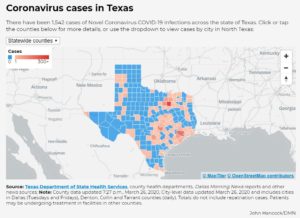
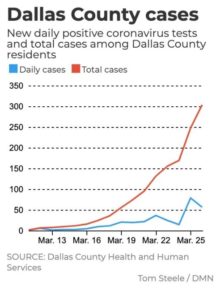 Dallas County was the first in the state to announce a shelter-in-place order, which went into effect Monday night.
Dallas County was the first in the state to announce a shelter-in-place order, which went into effect Monday night.


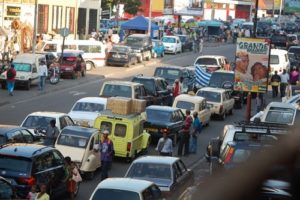

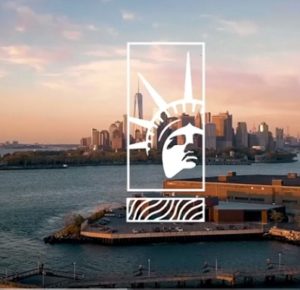 There are role models for us to emulate. Here is one example; we have been to New York City; we have studied the history and the progress of their transportation-focused Public Works. We have even published previous commentaries on the
There are role models for us to emulate. Here is one example; we have been to New York City; we have studied the history and the progress of their transportation-focused Public Works. We have even published previous commentaries on the 

 Got any money? Got any American coins or notes (US Dollars). Notice the engraving: ‘In God We Trust’. What does it mean?
Got any money? Got any American coins or notes (US Dollars). Notice the engraving: ‘In God We Trust’. What does it mean? Don’t get it twisted: American money having a reference to “trusting in God” does not make it divine, or backed by God. There is nothing sacred about American currency, and thusly, it can be replaced or supplanted. This is our dream!
Don’t get it twisted: American money having a reference to “trusting in God” does not make it divine, or backed by God. There is nothing sacred about American currency, and thusly, it can be replaced or supplanted. This is our dream!
 This benefit is so obvious that others have thought of this before …
This benefit is so obvious that others have thought of this before … (Note: The strategy to including the US Territories of Puerto Rico and the US Virgin Islands in the Caribbean Monetary Union is for Electronic Financial Transactions only).
(Note: The strategy to including the US Territories of Puerto Rico and the US Virgin Islands in the Caribbean Monetary Union is for Electronic Financial Transactions only). 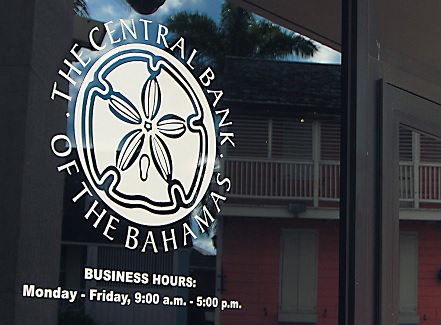 The Central Bank of The Bahamas (CBOB) officially announced yesterday that The Bahamas’ one cent coins as legal currency will be relegated to the annals of history.
The Central Bank of The Bahamas (CBOB) officially announced yesterday that The Bahamas’ one cent coins as legal currency will be relegated to the annals of history.

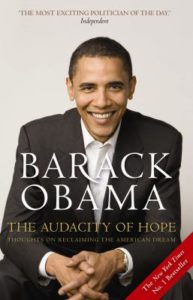 Title: The Audacity of Hope : Thoughts on Reclaiming the American Dream (2006)
Title: The Audacity of Hope : Thoughts on Reclaiming the American Dream (2006)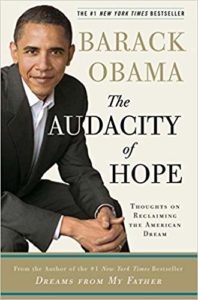

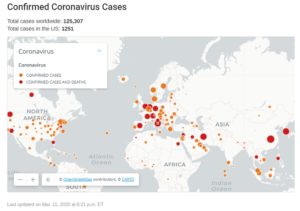
 Sick pay also helps soften the blow to demand which, along with a supply shock and a general panic, is hitting economies. These three factors, as China shows, can have a dramatic effect on output. Manufacturing activity there sank in February to its lowest level since managers were first surveyed in 2004. In the quarter to March the economy as a whole could shrink for the first time since the death of Mao Zedong. The OECD expects global growth this year to be its slowest since 2009. Modelling by academics at the Australian National University suggests that GDP in America and Europe would be 2% lower than it would have been in the absence of a pandemic and perhaps as much as 8% lower if the rate of deaths is many times higher than expected. Financial markets are pricing in fear. The S&P 500 has fallen by 8% from its peak on February 19th. Issuance of corporate debt on Wall Street has more or less stopped. The yield on ten-year Treasuries dipped below 1% for the first time ever.
Sick pay also helps soften the blow to demand which, along with a supply shock and a general panic, is hitting economies. These three factors, as China shows, can have a dramatic effect on output. Manufacturing activity there sank in February to its lowest level since managers were first surveyed in 2004. In the quarter to March the economy as a whole could shrink for the first time since the death of Mao Zedong. The OECD expects global growth this year to be its slowest since 2009. Modelling by academics at the Australian National University suggests that GDP in America and Europe would be 2% lower than it would have been in the absence of a pandemic and perhaps as much as 8% lower if the rate of deaths is many times higher than expected. Financial markets are pricing in fear. The S&P 500 has fallen by 8% from its peak on February 19th. Issuance of corporate debt on Wall Street has more or less stopped. The yield on ten-year Treasuries dipped below 1% for the first time ever.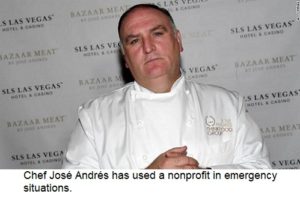 Celebrity chef José Andrés has mobilized his charity World Central Kitchen and set up camp near the Grand Princess cruise ship.
Celebrity chef José Andrés has mobilized his charity World Central Kitchen and set up camp near the Grand Princess cruise ship.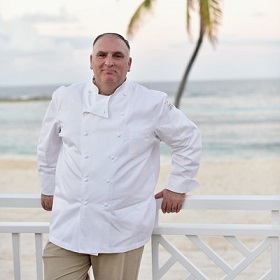 We gotta eat!
We gotta eat!
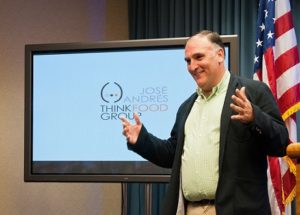
 The Bahamas, finally installing solar arrays, wants to send a message to the world – Big Polluters in particular – that societies can transform to alternative energy sources, use less fossil fuels and abate Climate Change.
The Bahamas, finally installing solar arrays, wants to send a message to the world – Big Polluters in particular – that societies can transform to alternative energy sources, use less fossil fuels and abate Climate Change. So we went from “planning the plan” to now “planning the action”.
So we went from “planning the plan” to now “planning the action”. The Go Lean book was written 5 years ago as a 5 Year Plan to reform and transform the Caribbean region. Had the plan been adopted by the regional stakeholders, then the Agents of Change would have been better addressed. The plan, or roadmap, to introduce and implement the Caribbean Union Trade Federation is still rearing to start; and while we cannot single-handedly solve Climate Change, we can better prepare the region for the heavy-lifting involved. The book describes the community ethos to adopt plus the many strategies, tactics and implementation that need to be executed.
The Go Lean book was written 5 years ago as a 5 Year Plan to reform and transform the Caribbean region. Had the plan been adopted by the regional stakeholders, then the Agents of Change would have been better addressed. The plan, or roadmap, to introduce and implement the Caribbean Union Trade Federation is still rearing to start; and while we cannot single-handedly solve Climate Change, we can better prepare the region for the heavy-lifting involved. The book describes the community ethos to adopt plus the many strategies, tactics and implementation that need to be executed.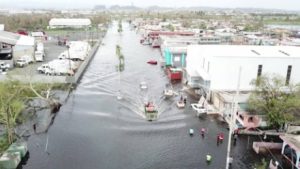
 This is an
This is an 
